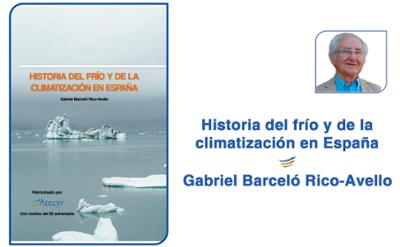

Air conditioning and refrigeration: tools to combat pandemics and climate change
Gabriel Barceló, member of the Madrid Association of Industrial Engineer and of Atecyr, confirms that air conditioning and refrigeration are cross-cutting tool in the fight against pandemics and climate change. The expert, in his latest two books (‘Air Conditioning and Refrigeration: after the Covid-19 pandemic and in the face of climate change’, published by AFEC, and ‘History of Cooling and Air Conditioning in Spain’, published by Atecyr) related his experience and research in the sector.
The first book (‘Air Conditioning and Refrigeration: after the Covid-19 pandemic and in the face of climate change’), offers an analysis of the role of refrigeration and air conditioning in the fight against climate change and against the Covid-19 pandemic; and presents the evolution and trends in heating and cooling technology, highlighting the current social and economic criteria of supranational institutions in the use of these techniques, considered necessary for the survival of human life, in the context of a sustainable economy.
According to the expert, society has realised that air conditioning and refrigeration are not just energy consumption sinks for personal satisfaction, but also important tools in the fight against pandemics and climate change. For this reason, there is currently a tendency to recommend the generalisation of these techniques to the entire population that requires them, for reasons of social justice and equity.
Health solutions
In the second book ‘History of Cooling and Air Conditioning in Spain’, Gabriel Barceló recalls how we 170 years ago we already possessed mechanical systems for continuous cooling, with many procedures invented for this purpose. The text makes reference to the historical background of ventilation, heating, cooling and its trade and air conditioning. And in the last chapter, it proposes future trends, especially in the face of evidence of anthropogenic climate change and its relation to the future use of air conditioning, suggesting that the gradual warming of the globe will require and increased number of more efficient and better systems, but possibly also more energy-intensive heating and cooling systems to protect human life and preserve health and living conditions.



